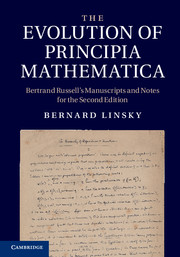 The Evolution of Principia Mathematica
The Evolution of Principia Mathematica Book contents
- Frontmatter
- Contents
- 1 Introduction
- 2 Writing the second edition
- 3 Logic since the first edition
- 4 Notation and logic
- 5 Improvements in the new edition
- 6 Induction and types in Appendix B
- 7 The reception of the second edition
- 8 The list of definitions for Carnap
- Introduction to the second edition
- Appendix A
- Appendix B
- Appendix C
- Hierarchy of propositions and functions
- Amended list of propositions: notes
- Bibliography
- Index
- Plate section
7 - The reception of the second edition
Published online by Cambridge University Press: 05 August 2011
- Frontmatter
- Contents
- 1 Introduction
- 2 Writing the second edition
- 3 Logic since the first edition
- 4 Notation and logic
- 5 Improvements in the new edition
- 6 Induction and types in Appendix B
- 7 The reception of the second edition
- 8 The list of definitions for Carnap
- Introduction to the second edition
- Appendix A
- Appendix B
- Appendix C
- Hierarchy of propositions and functions
- Amended list of propositions: notes
- Bibliography
- Index
- Plate section
Summary
“The foundations of mathematics”
Frank Ramsey's paper “The foundations of mathematics” (Ramsey, 1926) was presented to the London Mathematical Society on November 12, 1925, and so was likely written during the fall of 1924 after Ramsey had read the proofs for the second edition of Principia Mathematica. In the paper Ramsey makes repeated references to PM, citing the first volume of the new edition, and many points in the essay are best read as responses to the second edition. Indeed, the point for which the paper is most well known, the separation of the “mathematical” paradoxes from those due to semantics or “linguistics”, and the proposal to solve the former within the simple theory of types, misses the fact that Ramsey also proposes a new ramified theory of types as part of the solution of the semantic paradoxes. This modification of the type theory of PM turns attention to the very issues that concerned Russell in Appendix B. It is actually Ramsey's theory that should be given the joking name of the “ramsified theory of types” and which is here named “Ramsey's ramified simple types” or “RS-types”.
Ramsey introduces the paper as follows.
The object of this paper is to give a satisfactory account of the Foundations of Mathematics in accordance with the general method of Frege, Whitehead and Russell. Following these authorities, I hold that mathematics is part of logic and so belongs to what may be called the logical school as opposed to the formalist and intuitionist schools. […]
Information
- Type
- Chapter
- Information
- The Evolution of Principia MathematicaBertrand Russell's Manuscripts and Notes for the Second Edition, pp. 170 - 188Publisher: Cambridge University PressPrint publication year: 2011